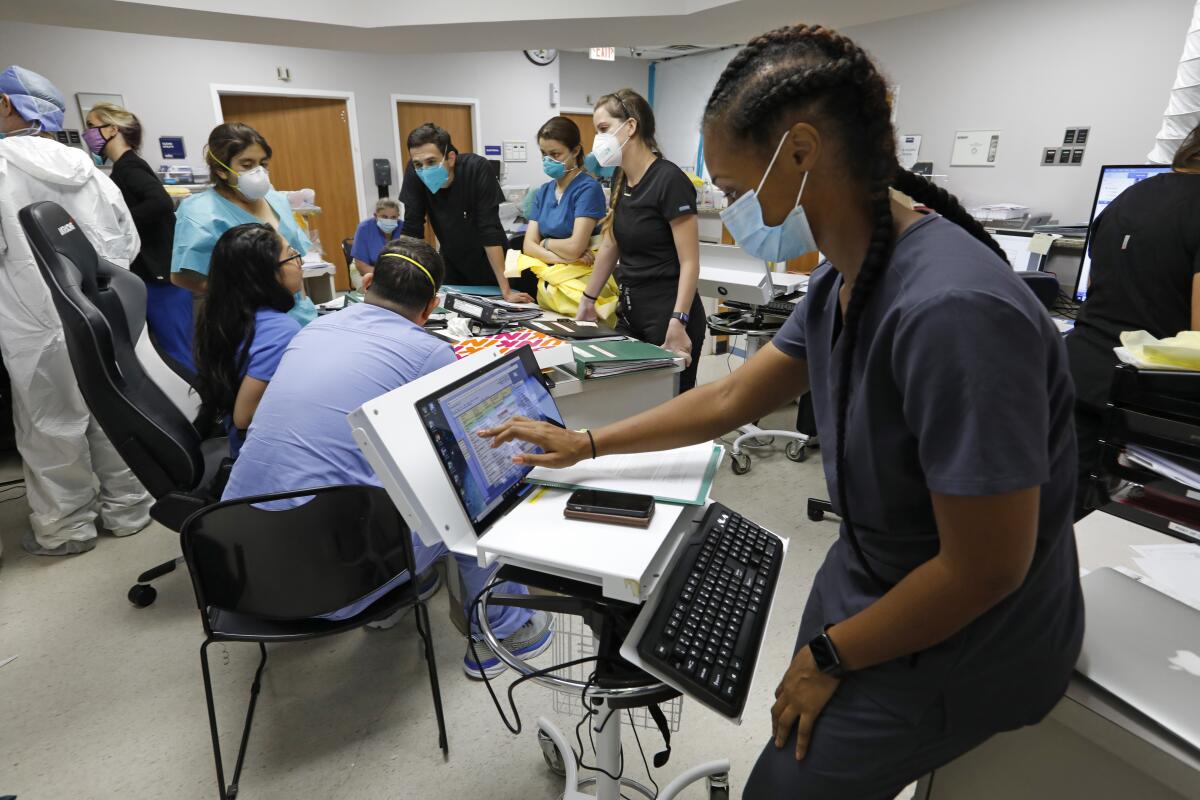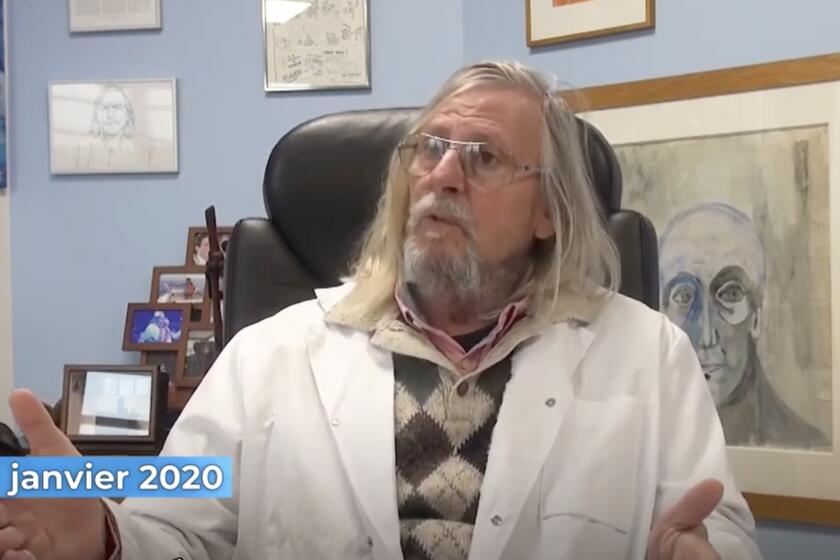Column: With fluvoxamine, doctors find an old drug that may actually work against COVID-19

- Share via
The quest for COVID-19 remedies has led patients and doctors into a few dead ends among old established drugs, such as hydroxychloroquine and Ivermectin. But there’s promising news that another generic medicine has shown the ability to moderate the course of the disease.
The drug is fluvoxamine, an anti-depressant that has been prescribed chiefly by psychiatrists for patients with obsessive-compulsive disorder, or OCD.
Several clinical trials, including a large trial with 1,500 test subjects, indicate that the drug may help COVID-19 patients in the early stages of the disease stay out of the hospital and avoid long hours under the eyes of emergency room physicians.
We have an intervention here that potentially provides a very large treatment effect at a very low cost.
— Edward Mills, McMaster University
Fluvoxamine, which has been around since the 1980s, isn’t being hailed by the claques of advocates, including anti-vaccine activists, who have been pushing the anti-malarial hydroxychloroquine or the anti-parasite drug Ivermectin, neither of which has been shown to have any effect on COVID-19.
That may be because it won’t work as an alternative to vaccines. Unlike the others, however, fluvoxamine has a plausible mechanism of action that may explain how it works for COVID-19 patients and why it should be a candidate for inclusion in the slowly expanding arsenal of treatments.
Get the latest from Michael Hiltzik
Commentary on economics and more from a Pulitzer Prize winner.
You may occasionally receive promotional content from the Los Angeles Times.
“The good thing is that fluvoxamine is an inexpensive, easy to use and widely available drug,” Eric Lenze, a professor of psychiatry at Washington University in St. Louis who conducted one of the first clinical trials of the drug’s effect on COVID-19, told me by email.
“We already know about its safety, since it has been on the market for more than 25 years,” Lenze says. “I am hoping that the medical and scientific community embraces this as a proven treatment for early COVID-19 and it starts to be utilized.”
Fluvoxamine’s potential as a COVID-19 treatment hasn’t entirely been a secret. It was the subject of a “60 Minutes” report in March that featured Lenze and his Washington University colleague Angela Reierson, who had recalled an earlier study that found that the drug reduced inflammation in mice.
Since the inflammation effect was what accounted for the medical deterioration of many COVID-19 patients, Reierson reasoned, the drug might work for humans.
Ivermectin, touted as a treatment of COVID by the anti-vaccine crowd, has “no effect,” according to a major study.
The attention being devoted to fluvoxamine points to the value of sober scientific study of COVID-19 interventions as opposed to politically or ideologically motivated frenzy. Untold financial and intellectual resources have been wasted on studies of drugs that could not have passed the bedrock standards warranting further study.
Hydroxychloroquine was initially promoted by a French immunologist whose initial claims were dubious on their face, then was taken up by Donald Trump and medical mountebanks with sizable public followings, despite the lack of any evidence of its usefulness as a treatment.
Ivermectin, which is chiefly a veterinary drug used for deworming livestock and for some human parasitic diseases endemic in rural or tropical regions, became a hobby horse for those claiming that information about proven remedies for COVID-19 was being “suppressed” at the behest of drug companies that expected greater profits from vaccines.
Both drugs entered the public debate adorned with exaggerated claims for their effectiveness. That hasn’t been true of fluvoxamine, which has garnered interest in the medical community in part due to the circumspection with which it has been treated by researchers.
Lenze’s study involved 152 patients, of whom about half received a placebo. He found that none of the 80 who received the drug experienced medical deterioration such as shortness of breath or the need for hospitalization, while six of the 72 who got a placebo did show those medical symptoms. Lenze is scheduled to discuss the results at a symposium sponsored by the National Institutes of Health on Friday.
Another small trial, involving employees at the Berkeley racetrack Golden Gate Fields following a disease outbreak in January, found that none of the 77 workers who opted to try fluvoxamine required hospitalization, compared with six of the 48 who refused the drug.
Within weeks, the other workers were clamoring for the drug, according to David Seftel, the racetrack physician.
State medical boards are warning doctors not to spread COVID falsehoods, but will that stop them?
The largest and most painstaking trial produced the most scientifically valid results. That’s a just-completed trial in Brazil with 1,472 patients randomly divided into fluvoxamine and placebo groups.
The so-called Together Trial has been testing several purported treatments; we reported recently on its findings that neither Ivermectin nor hydroxychloroquine had any therapeutic effect on COVID-19.
The results on fluvoxamine were strikingly different. “This is the first drug we’ve tried out that found a significant effect,” Edward J. Mills, who oversees the Together Trial out of McMaster University in Canada, told me.
The fluvoxamine patients experienced about a 30% reduction in risk — defined as longer than six hours’ observation in an emergency department or hospitalization — compared with the placebo group.
The results yielded a 99.6% probability that fluvoxamine works better than a placebo, Mills told a National Institutes of Health symposium on Aug. 6. That’s a worthy goal, since keeping patients out of the ER or inpatient wards will help to alleviate the sort of surges in cases being seen throughout the country now.
The 10-day treatment of 200 milligrams per day used in the Together Trial would cost about $4, Mills told his audience. “So we have an intervention here that potentially provides a very large treatment effect at a very low cost,” he said.
President Trump’s hype of a potential treatment for COVID-19 gives false hope to virus patients and causes real harm to others.
The Together participants had to be over 18, suffering COVID-19 symptoms for no longer than seven days along with a positive coronavirus test, and having at least one condition that placed them at high risk for serious disease, such as hypertension, diabetes, heart disease, obesity or a recent bout with cancer.
They were excluded if they were taking an antidepressant already, since an interaction with fluvoxamine was potentially hazardous.
The full 28-day observation period of patients in the Together Trial won’t be complete until Aug. 25, Mills says, at which point the full results will be submitted for publication.
But the drug’s presumed mechanism against COVID-19 explains why it’s no substitute for vaccination and presumably won’t work to stave off infection in the first place, the definition of a “prophylactic.” It doesn’t appear to act on the virus itself, as do the leading vaccines.
“Nothing has been proven to work for prophylaxis apart from the vaccines,” Mills says.
Instead, researchers conjecture, fluvoxamine reduces inflammation.
That’s important, Mills said at the symposium, because “by the time you are symptomatic, I don’t think this is predominantly a viral illness anymore so much as it’s become an inflammatory illness. Probably the drugs that work in the early treatment as well as hospitalized patients tend to be ones that are not working directly on the virus. That’s something we’re going to have to evaluate in more detail.”
More to Read
Get the latest from Michael Hiltzik
Commentary on economics and more from a Pulitzer Prize winner.
You may occasionally receive promotional content from the Los Angeles Times.














